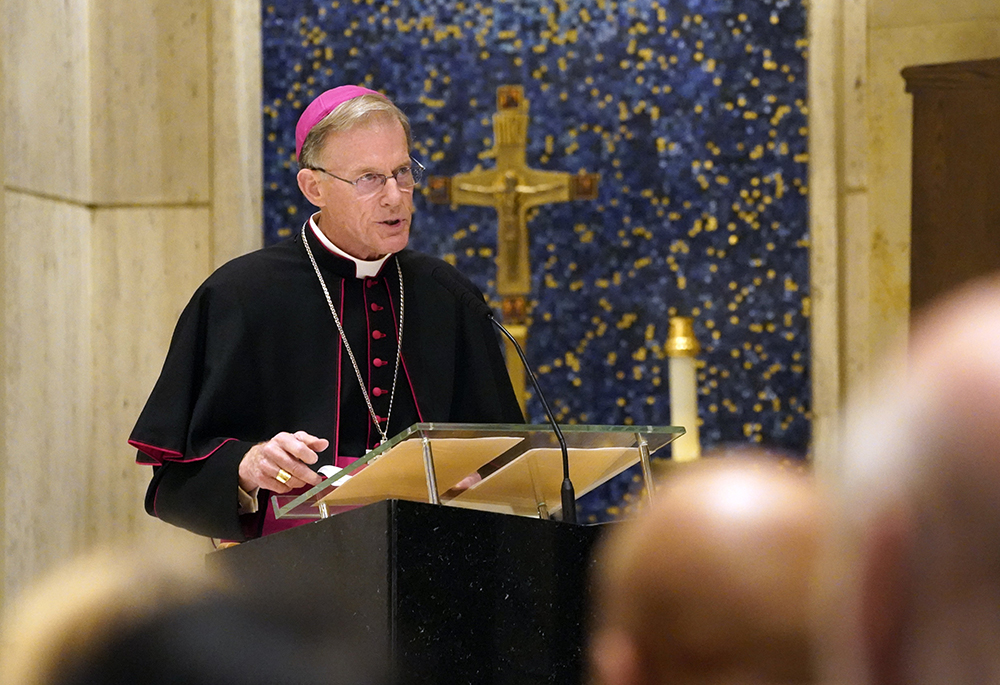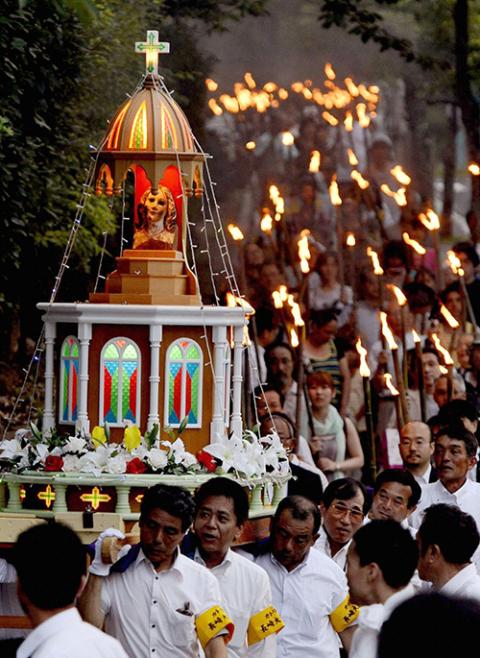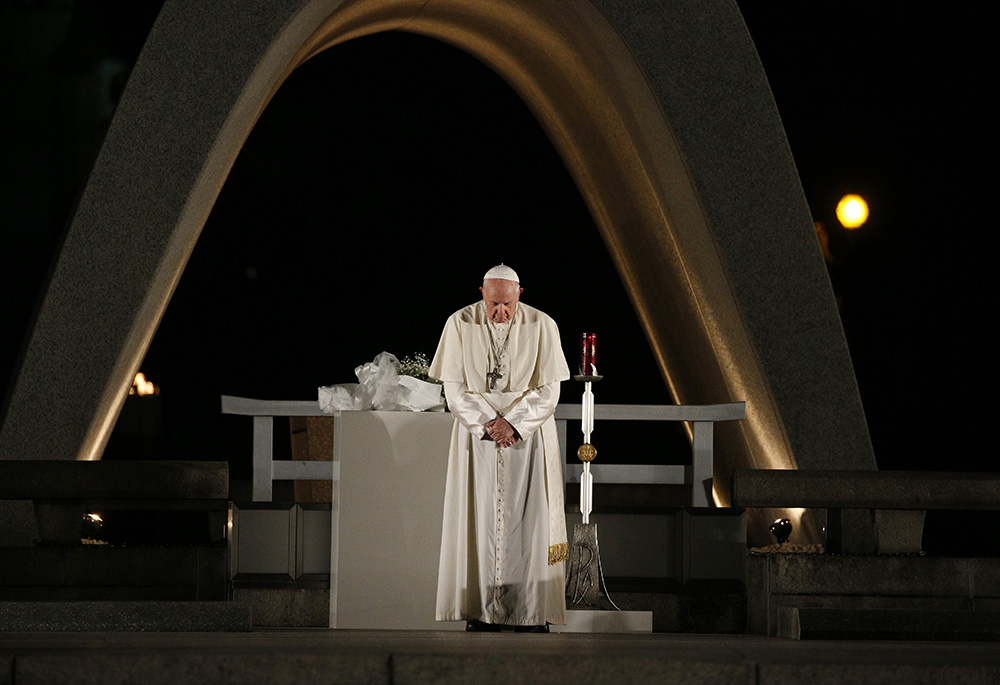
Archbishop John Wester of Santa Fe, New Mexico, offers a reflection on the urgent need for nuclear disarmament during a prayer service for United Nations diplomats at the Church of the Holy Family Sept. 12, 2022, in New York City. U.S. bishops are undertaking a "Pilgrimage of Peace" to Hiroshima and Nagasaki, to advocate for nuclear disarmament. (CNS/Gregory A. Shemitz)
Santa Fe Archbishop John Wester is calling on Catholics in the U.S. to have an "urgent conversation" about the continued risks posed by the stockpiling and development of nuclear weapons.
Wester, who is undertaking a five-city "Pilgrimage of Peace" to Japan this week with Seattle Archbishop Paul Etienne to promote nuclear disarmament, told NCR in a recent interview that Americans have been "lulled into a false sense of complacency" about the possible dangers of a nuclear conflict.
"Even though we're in a sense of complacency, we should not be," said Wester. "It's one of those things where it's all or nothing. We either completely avoid nuclear war, or we're completely destroyed by it. There's no in-between."
Wester spoke to NCR in late July, as he was preparing for the Aug. 2-9 voyage. As part of the trip, he and Etienne will also commemorate the anniversaries of the U.S. atomic bombings of Hiroshima and Nagasaki on Aug. 6 and Aug. 9, 1945, respectively.
During the interview, the archbishop spoke about his reasons for making the trip, Pope Francis' shifting of Catholic teaching away from acceptance of the global system of nuclear deterrence, and the personal calling he feels as the archbishop of Santa Fe to speak out against nuclear weapons. He also reflected on his January 2022 pastoral letter on the issue, "Living in the Light of Christ's Peace: A Conversation Toward Nuclear Disarmament."
Following is NCR's conversation with Wester, edited lightly for context.
NCR: Why is it so important for you and Archbishop Etienne to make this pilgrimage? Why did you want to do this now?
Wester: What prompted the trip was basically my pastoral letter. My writing committee and I, we meet regularly about this issue — about multilateral, verifiable nuclear disarmament. It just dawned on me that our connection with Hiroshima and Nagasaki is basically the bomb. But it should be the peace of Christ, the light of Christ.
Light is a very important theme in Japan. It's a country of light. And this intermingles with the light of Christ. He was the light that pierces the darkness, the paschal candle. But sadly, it also intermingles with the light that was produced by the atomic bomb, which was not a light of peace but a light of destruction.

People carry the remains of a statue of Mary that survived the Nagasaki atomic bomb as they march through the streets of the city Aug. 9, 2012. Several U.S. bishops are undertaking a "Pilgrimage of Peace" to Hiroshima and Nagasaki, to advocate for nuclear disarmament. (OSV News/Kyodo, Reuters)
We want to confirm that the light of Christ is the light that we share with Japan, not the bomb. We approached the archbishop of Nagasaki and the bishop of Hiroshima, and we're very grateful for their response. They're very eager for us to come, and we're eager to go. I think it's going to be a very significant trip.
This is more tangential, but in 2025 it will be the 80th anniversary of the bombings. The Japanese bishops are already preparing for that. Archbishop Etienne and I are looking forward to being with them, to pray with them, to commemorate these two events with them, and to see how our four dioceses can work together to promote peace and particularly to work toward verifiable, multilateral disarmament.
Is there a message you're hoping the pilgrimage or your pastoral letter might send to U.S. Catholics about the continued urgency or seriousness of the nuclear weapons issue?
That's one of the main objectives: to heighten an awareness among all peoples of the urgency and critical importance of this issue. Sadly, we've been lulled into a false sense of complacency, mainly because of the narrative of deterrence.
We just want an urgent conversation about the critical and dangerous position that we're in. And even though we're in a sense of complacency, we should not be. Because it's one of those things where it's all or nothing. We either completely avoid nuclear war, or we're completely destroyed by it. There's no in-between.
A nuclear conflagration, an Armageddon-type event, would wipe out civilization throughout the planet. It would spawn a 10-year nuclear winter. Computer projections are that 5 billion people would die of starvation, because there would be no sunlight, no growth — the planet would be frozen.
If you read Cormac McCarthy's book The Road it gives a very visceral sense. It's a fictional account, but it's a pretty well-reasoned account of what probably would transpire in such a case. The old saying is "where the living would envy the dead."
Advertisement
Pope Francis has spoken frequently about the dangers of nuclear weapons. He has visited Japan. In his own teachings, there's been a shift from the acceptance of the system of deterrence to calling even the possession of nuclear weapons "immoral." How do you see that shift, and do you think Catholics are aware of the pope's development on this subject?
It's critically important, because what the pope did is he really moved the moral needle. As you know, the 1983 peace pastoral from the U.S. bishops' conference did allow for deterrence. But I think it's important not to be deceived by this narrative. From the very beginning, the United States has never had simply deterrence as its strategy. It's always had a first-strike capability strategy, as well.
People think that as long as we have deterrence we are in a neutral position, everything is fine. But it's not. The danger of nuclear war is always there. The Ukrainian war has heightened awareness of that fact alone. Deterrence is not a strategy. It's a very dangerous game to play and it's not a solid, sound strategy.
As former Defense Secretary Robert McNamara said, the only reason we didn't go to nuclear war in 1962 during the Cuban Missile Crisis was luck. And I think we would all agree that luck is not a very good strategy. I think what we need to do is see that we've been lucky, we've been providentially blessed that God's grace has somehow kept us from any kind of a huge tragedy, either intended war or accident.
No one wants to talk about nuclear Armageddon or a nuclear winter. But we all know prudently and maturely that we have to talk about it. We've got ourselves into this mess and so we human beings have to get ourselves out of it. And the way to get out of it is to get rid of the weapons.

Pope Francis participates in a moment of silence during a meeting for peace at the Hiroshima Peace Memorial Nov. 24, 2019, in Hiroshima, Japan. (CNS/Paul Haring)
Do you feel a special calling here in terms of being the archbishop of Santa Fe, which is home to the Los Alamos National Laboratory?
Yes, I do. And this is not new. I want to emphasize that I'm very impressed with and pleased to see that my predecessors also were very — the archdiocese has spoken out about this before. Particularly, in the 1980s we had protests and we tried to heighten sensitivity.
With the pastoral letter, we hoped to kind of raise up this issue again. Part of it, too, was initiated by the fact that the United States is giving Los Alamos billions of dollars to modernize its production of plutonium pit cores.
It's like nuclear arms forever, that's what we've got. It's just gone the wrong way. Not only have we not stopped the progress we've made, we're actually trying to modernize. It's like somebody who is driving out of control, and, so far, they're within the guardrails, but you just know, if this keeps up, we're going to go off the cliff someday. We've got to be able to stop it.
I know one of the big issues is the economics of it. There's big money to be made. I realize that's a powerful force in our societies. The military-industrial complex is a powerful machine. It's hard to get it to switch gears. But we've got to. And I firmly believe that those laboratories can be used for peaceful purposes.
On that subject, you mentioned in your letter a desire to be in conversation with Catholics who have jobs at the nation's nuclear laboratories, or who serve in the military. What is your message to those tasked with working on nuclear weapons?
I understand that it's complicated. It's not a simple moral question. It's not "should I or should I not rob a bank?" No, you shouldn't. That's immoral. But this is a question that's a little more complex. Because, obviously, we cannot have unilateral disarmament. That would not be sensible or prudent.
It has to be multilateral. That's what I keep emphasizing. Because I think some people think that we're just being naive. But our response to that is "who's really naive?" I think the people who are naive are the ones who think we can live with nuclear weapons. I think that's real naivete, because that's just bound to fail. Thank God it hasn't failed yet. But it's bound to.
From my point of view, I would say to Catholics, if they are working at Los Alamos or Sandia National Laboratories or the Lawrence Livermore National Laboratory, I'd say right now the key is to be working toward nuclear disarmament. And so, I can see that there would be some people, and I know some have, that they would choose not to work at these laboratories, because of the destructiveness of them.
But I can also see somebody, morally speaking, who would say, "No, I think because this is going to be a long-range project, obviously, I think for the time being we need to have what we have." As long as they were saying this is part of a larger trajectory of getting rid of nuclear weapons, then I could see that as being morally acceptable. Not preferable, but acceptable.
There is so much buzz about the movie Oppenheimer. Do you have a perspective about what that says about the culture, or the renewed interest in thinking about these weapons again?
I think it's a good thing. I'm reading the book right now, American Prometheus: The Triumph and Tragedy of J. Robert Oppenheimer. It's an excellent book. He was definitely a very interesting person, who, evidently, really was against pursuing the later continued development of nuclear weapons.
I think it's going to raise consciousness among people. There will be some people who say, "My goodness, what have we done?" And I think some of the scientists at the time thought that.
This is something that brings up the question: Because we can do something, should we do it? I think it's like we're playing God. I think humanity has to have more humility. I think God has given us the ability to invent for good. But I think we have to have a little bit of humility and not hubris when we're dealing with such realities and such potential power and force. It's just too much power for human beings to have. And our track record isn't so good when it comes to that.








